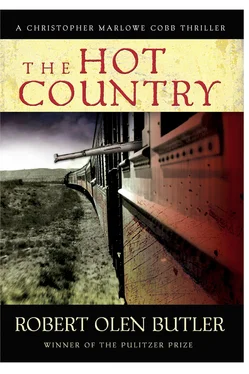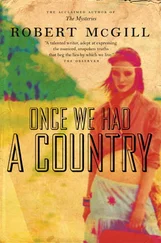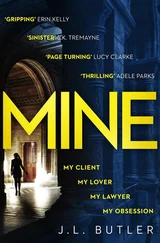“It is,” he said.
And I said no more. He said no more.
If he was watching the crowd too — which he must have been; he was certainly not staring at me — then eventually he’d want to keep the connection going. Even if just a little bit.
It took a while. But finally he said, “They will not go forward, these Americans, do you think?”
“Their president has no balls,” I said. I did not look at him, but I felt him — what? hard to describe — do something like a faint expansion of his chest to hear his own thought confirmed in the very terms he’d thought it. But I had to be careful. No more allusions to his envelope.
“You are right,” he said. “We have a way of saying that in German.”
He was about to try out his line for Villa. I still wouldn’t look at him, though I thought he had turned to me now. I would have trouble keeping the eagerness out of my face.
“ Dieser Nation hat doch keine Eier, ” he said
I clenched the fist that was sitting on my thigh. I’d picked up the critical, unexpected word. The whole nation has no balls. The United States of America. Not just Woodrow Wilson. Or eggs, actually. The U.S.A. has no German balls, which are rather like eggs. I was tempted to ask him if that was chicken eggs that Germans were proud of having. Goose eggs? Quail eggs?
I bucked up my reportorial objectivity.
I looked at him.
He winked at me. He offered no full translation.
I smiled and nodded and hoped it didn’t look forced.
We stayed silent. He looked away. I looked away.
The crowd jostled very near us and a woman’s rebozo loosened from her chest and an infant’s head and shoulders emerged and swayed close to Mensinger, nearly into his face. He recoiled and his hands moved out of sight and I wondered if he still had his pistol on his far hip, if his hand had gone there by reflex. The woman caught up her child and the crowd flowed on, and the space before us, though slight, was clear again. It was enough. Mensinger’s hands reappeared and stretched to his knees and settled there, his arms straight and stiff. He was resolved not to be provoked by these people.
But he was. They deeply unsettled him. He needed to talk, to escape inward. “They are full of guile, however, these Americans,” Mensinger said. “We can say they have no manhood and it is true, but they still can cause trouble.”
I turned my face to him. He was not looking at me. He had once again, to my eye, become his scar, upward-bent, like a musing frown. It was all I saw for the moment. He was going on: “They can meddle in things that are not their affair. This much is clear from Vera Cruz.”
He paused. He seemed to be watching the crowd, but he’d retreated into his mind. His scar pivoted away. He fixed his eyes intently on mine. “Is this not so?” he said.
I had an abrupt stopping in me, a hot flush in the face from being caught. I heard this as a direct challenge, as if he knew I was an American. But he said, “I ask for your opinion as one who shares a long and vulnerable border.”
I shrugged, glanced away for a second to recover my composure.
I said, “Their President seems timid.” I believed it. I hated to admit it to this Hun. But I needed to draw him out.
“They are not so far removed from Theodore Roosevelt,” Mensinger said. “He was more like a German. So there is that element in the Americans. This is the trouble with a mongrel country. They are inconsistent. And I do not expect even this man Wilson to be timid forever.”
Mensinger was sounding a little heated now. He seemed to realize it. He stopped abruptly. “ So, ” he said. And he shut up again.
But quotes. Quotes. I already had some very fine quotes for my story, straight from a German secret agent.
“What is your work?” Mensinger suddenly asked. He realized he’d been talking too much, even with an apparently meaningless Canadian. He wanted to know if he’d made a mistake.
“Coffee,” I said. “Mexican coffee. High-mountain, shade-grown, cheap-and-getting-cheaper coffee. Wonderful beans. Did you smell the coffee in the warehouses of Esperanza? Great bouquet. Half those beans will end up in Canadian cups. It’s cold and it’s dark in Canada. We need to get our blood going and we do it with Mexican coffee, which I export to great profit for the everlasting benefit of my countrymen.”
I had no idea where all that came from. Unpremeditated. Improvised. To be honest, actors — who were, collectively, my aunts and uncles, my older sisters and brothers, my trainers and my professors, my fathers — through all my formative years — actors, I say — including the actor I myself often am — sometimes scare the hell out me.
But Mensinger, who I’d been playing to as if he were the Mayor of New York in a loge box with his party at the Belasco, seemed convinced. He very slightly tilted his head and nodded. “I like a good cup of coffee,” he said. “But strong. Very strong. Your Mexican coffee is not strong.”
“It can be made strong.”
“Very strong,” he said. “Strong in the bean.”
“Strong in the bean,” I said. “Right. Of course. I don’t think Mexican coffee is strong in the bean.”
“No.”
“No.”
“Some people cannot take it strong in the bean,” he said. And by “people” I gather he meant “nations.”
“In your country you make sure you buy it strong,” I said.
“In the bean. Yes. Very.”
“And what do you do for a living, Herr Mensinger?”
He did not miss a beat. “I also am a businessman.”
He offered no more.
“What sort of product?” I said.
“Money,” he said. “Money is the product. I advise banks. There are some very powerful German banks in Mexico.”
I was not interested in having him elaborate on his cover identity. So I took the opportunity to chip away at any suspicion he might have had about me. I said, “Can I ask you a question about your German bankers in Mexico?”
He did not answer. His lower lip pushed up into the same curve as his scar.
I said, “What do they do for strong coffee?”
It was not what he expected, of course. The face froze for a moment, and then he actually smiled and chuckled. A creepy smile. His mouth undid its curve, flattened, then spread wide and puckered a little at the corners and opened in a quarter smile with gray teeth. The chuckle was a slow turn of a Gatling gun. None of this, of course, prompted by a sense of humor. I didn’t think he was capable of perceiving irony, much less attributing it to a Canadian stranger, much less appreciating it as a subtle joke. This was a smile and chuckle of cultural and intellectual superiority. Prompted by my continuing to think and talk and ask such questions as this about coffee after he had already made the international politics of that subject clear to anyone who had ears to listen.
“They suffer,” he said.
I put on a sympathetically constricted face. I nodded.
I looked out to the crowd for a moment, to let Mensinger assume a drift in my shallow Canadian mind. Without looking at him I said, “Will these Mexicans ever have a viable government again?”
Mensinger snorted. “They need another Díaz.”
“Perhaps Carranza. He seems keen on taking over.”
Mensinger snorted again. “A weak man. He is no Díaz.”
“Not strong in the bean,” I said. Now I looked at Mensinger, ready to put on a vapid face for him, to keep him off guard.
“Not strong in the bean,” he said. I had him, for the moment at least. He’d bought into the metaphor and was watching the crowd. He was thinking — and not about me. This was good.
“Pancho Villa, then?” I asked.
“He is very strong in the bean,” he said.
Читать дальше












